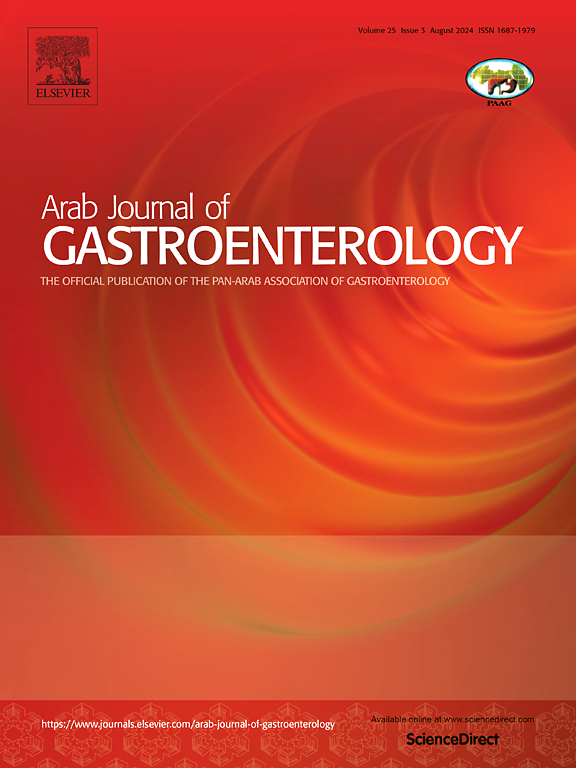Mesenchymal stem cell derived exosomes as Nanodrug carrier of doxorubicin combined with PVT1 siRNA inhibits the progression of gastric cancer
IF 1.1
4区 医学
Q4 GASTROENTEROLOGY & HEPATOLOGY
引用次数: 0
Abstract
Background and study aims
Mesenchymal stem cell-derived exosomes (MSC-Exos) have been used as drug delivery vehicles for the treatment of gastric cancer. This study aimed to explore the effects of doxorubicin-loaded exosomes (Exo-Dox) combined with the long noncoding RNA PVT1 on gastric cancer (GC) development.
Material and methods
CCK-8 and immunohistochemistry were used to assess cell proliferation. The morphology and size of the exosomes and Exo-Dox were determined. The distribution of free Exos and Exo-Dox in cells was observed under a fluorescence microscope. Cell migration and invasive ability were assessed using wound healing and Transwell assays. In addition, the protective effects of Exo-Dox were confirmed in a xenograft tumor model.
Results
Exosomes were successfully isolated from MSCs and identified. The size of Exo-Dox was greater than that of free Exos. The acidic environment promoted the release of doxorubicin, and exosomes promoted the cellular uptake of doxorubicin. Compared with doxorubicin alone, Exo-Dox exhibited better antitumor effects on gastric cancer, inhibiting the growth, migration and invasion of gastric cancer cells. Additionally, combined therapy of Exo-Dox with si-PVT1 clearly suppressed the proliferation, migration and invasive ability of gastric cancer cells. Exo-Dox combined with si-PVT1 inhibited tumor growth and metastasis in a xenograft model.
Conclusion
Doxorubicin-loaded exosomes combined with si-PVT1 suppressed the progression of GC.
间充质干细胞外泌体作为纳米药物载体联合PVT1 siRNA抑制胃癌的进展。
背景与研究目的:间充质干细胞衍生外泌体(MSC-Exos)已被用作治疗胃癌的药物递送载体。本研究旨在探讨负载阿霉素的外泌体(Exo-Dox)联合长链非编码RNA PVT1对胃癌(GC)发展的影响。材料与方法:采用CCK-8和免疫组织化学方法评价细胞增殖。测定外泌体和Exo-Dox的形态和大小。荧光显微镜下观察游离Exos和Exo-Dox在细胞内的分布。采用伤口愈合和Transwell试验评估细胞迁移和侵袭能力。此外,Exo-Dox的保护作用在异种移植肿瘤模型中得到证实。结果:成功分离并鉴定了MSCs外泌体。Exo-Dox的大小大于游离Exos。酸性环境促进阿霉素的释放,外泌体促进阿霉素的细胞摄取。与单独使用阿霉素相比,Exo-Dox对胃癌表现出更好的抗肿瘤作用,抑制胃癌细胞的生长、迁移和侵袭。此外,Exo-Dox与si-PVT1联合治疗可明显抑制胃癌细胞的增殖、迁移和侵袭能力。Exo-Dox联合si-PVT1在异种移植模型中抑制肿瘤生长和转移。结论:负载阿霉素的外泌体联合si-PVT1可抑制胃癌的进展。
本文章由计算机程序翻译,如有差异,请以英文原文为准。
求助全文
约1分钟内获得全文
求助全文
来源期刊

Arab Journal of Gastroenterology
Medicine-Gastroenterology
CiteScore
2.70
自引率
0.00%
发文量
52
期刊介绍:
Arab Journal of Gastroenterology (AJG) publishes different studies related to the digestive system. It aims to be the foremost scientific peer reviewed journal encompassing diverse studies related to the digestive system and its disorders, and serving the Pan-Arab and wider community working on gastrointestinal disorders.
 求助内容:
求助内容: 应助结果提醒方式:
应助结果提醒方式:


